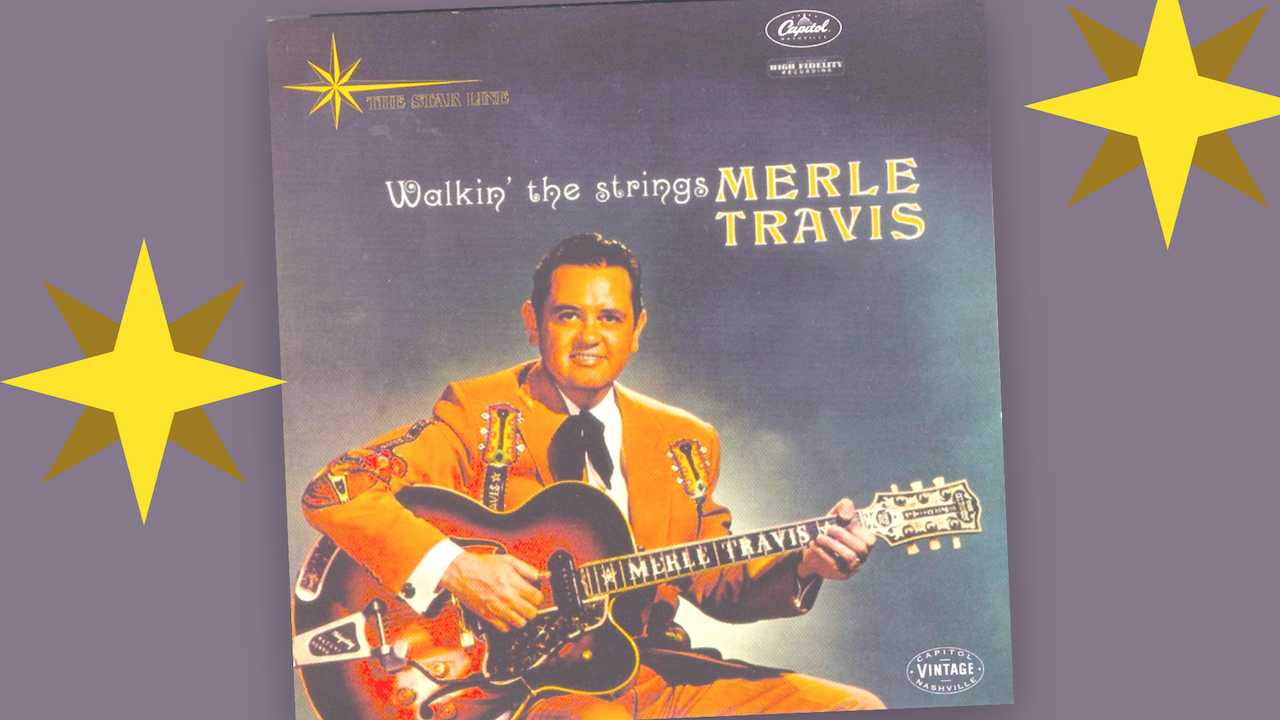"I’ve taught Travis picking at least 500 times but whenever I’ve asked a student, 'Do you know who Merle Travis is?' I’ve never heard, 'Yes!'" A deep dive into Walkin’ the Strings, an album whose influence is everywhere in our guitar lives
As well as writing popular standards like “Sixteen Tons”, Merle Travis was idolised by peers like Scotty Moore and the Everly Brothers. Walkin’ the Strings is a flashy, intimate and soulful masterclass of his stunning playing at its peak

All the latest guitar news, interviews, lessons, reviews, deals and more, direct to your inbox!
You are now subscribed
Your newsletter sign-up was successful
If you've played fingerstyle, rockabilly, the Beatles’ “Blackbird” or Fleetwood Mac’s “Landslide,” you’re familiar with Mr. Merle Travis.
Merle defined alternating-bass guitar, pioneered the design of the solidbody electric, played a key role in shaping rockabilly guitar and handed his stylistic torch to the likes of Chet Atkins and Lenny Breau, who both brought his style to new heights and discoveries.
Despite this, I’ve taught Travis picking at least 500 times, and whenever I’ve asked a student, “Do you know who Merle Travis is?” I’ve never heard, “Yes!”
Well, ladies and gentlemen, Walkin’ the Strings is Merle Travis. Capitol released it in 1960, drawing its tunes from a selection of casual and intimate solo recordings he made for radio broadcast beginning in the mid 1940s.
Despite its cover showing the guitarist with his Gibson Super 400 electric, Merle used his Martin D-28 acoustic for all but one of these 22 tracks.
The performances, which range from full songs to brief snippets, are filled with dynamics, driving rhythms and stunning guitar work that always has an eye on the audience.
The album opens with the title track, a showcase of jaw-droppingly fast arpeggios that seals the deal immediately. “Little David Play Your Harp” features a Travis vocal that is reminiscent of Josh White and drips with gospel soulfulness.
All the latest guitar news, interviews, lessons, reviews, deals and more, direct to your inbox!
The instrumental “Saturday Night Shuffle” follows with classic American Songbook harmony as well as charming bends and captivating breaks that speak to the listener. “Thumbing the Bass” is played at breakneck speed and demonstrates Merle’s ability to play the guitar like a piano.
A personal favorite of mine is “Cane Break Blues,” which clocks in at a brief 1:15, during which Merle delivers a masterclass on the 12-bar blues, with dozens of iconic licks and turnarounds.
On “Darby’s Ram,” he tells a story before he launches into the tune, and it feels like a bedtime story for the masses.
“Everly Rag” is a tribute to Ike Everly, father of the Everly Brothers and a mentor to young Merle. Though just 38 seconds long, it’s not the shortest track here.
Up next is ”Rose Time,” where Merle ventures into lovely unexpected harmony reminiscent of 1920s guitar pioneers like Eddie Lang, Nick Lucas and Dick McDonough. “Old Aunt Dinah” brings us back at an almost shocking, flashy tempo where Merle rips and entertains.
“My Old Kentucky Home” is a midtempo piece with sledgehammer alternate bass that leads to the showstopper, “Pigmeat Stomp.”
Side two opens with the classic “Blue Smoke” before Merle plays “Dry Bread,” which starts with a spoken-word introduction about hard work and tough times.
“Louisville Clog” lifts the spirits with an uptempo groove, flash and great harmony, after which we get the album’s sole electric guitar track, “On a Bicycle Built for Two,” where Merle plays the melody under the accompanying chords via an overdub. Thankfully, we get to hear his use of the vibrato bar when playing a melody.
We return to solo acoustic on the 53-second “Green Bay Polka” and move on to “Jordan Am a Hard Road to Travel,” a biblical story that is followed by the action-packed “Travis Trot,” which, at 29 seconds, is the shortest performance on this satisfying LP.
It’s followed by Merle’s centerpiece, “Cannon Ball Stomp,” which he was known to pick using only a thumb pick and index finger. “Fuller Blues,” “Blue Bell” and “Take My Hand, Precious Lord” end this eventful LP, that feels like a great Merle Travis concert.
Merle Travis is everywhere in our guitar lives. If you’re looking for a record to meet the man, Walkin’ the Strings is a great place to start. I feel uplifted by its music and I walk away feeling like I made a new friend.
Walkin' the Strings is streaming now; Merle Travis: Sixteen Tons: His 30 Finest 1946-1954 is available to buy
Jim Campilongo has 14 critically acclaimed instrumental records available on vinyl, CD and digital download here.

